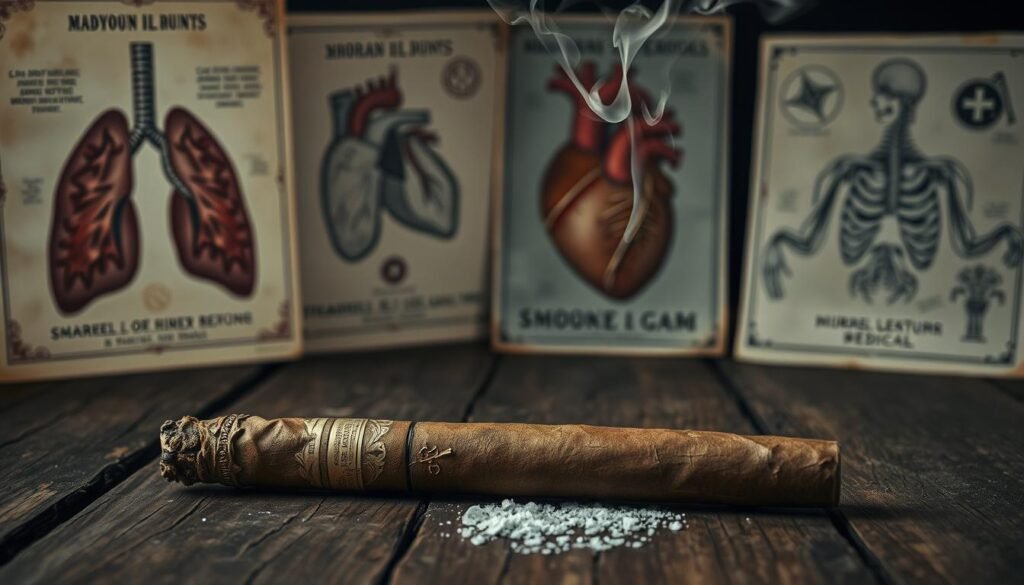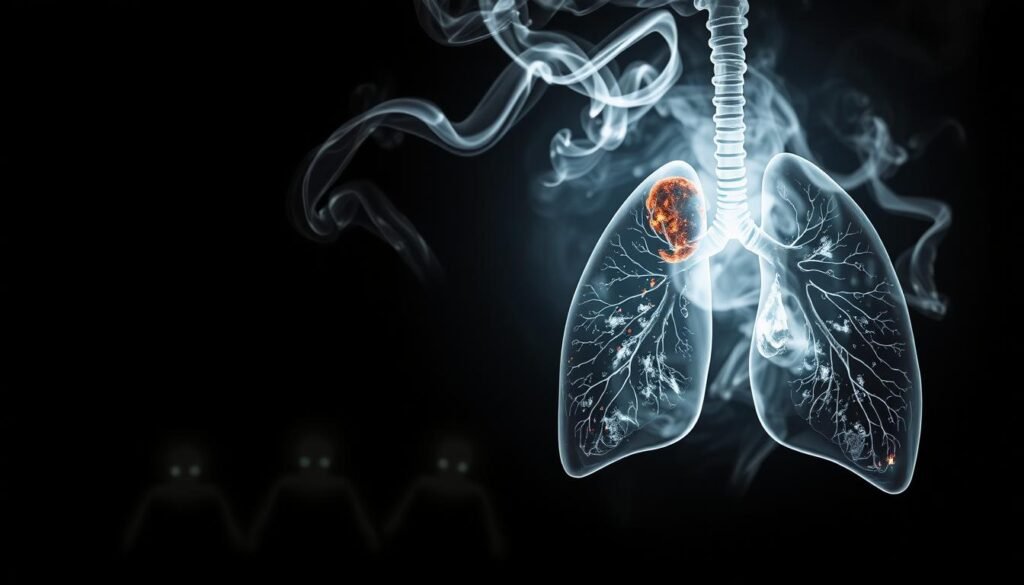Did you know cigar smoke has more tar than cigarette smoke? It exposes smokers to lots of toxic substances. This fact highlights the serious risks of cigar smoking. Many people underestimate these dangers.
Some think smoking cigars is less harmful than cigarettes. But, both are equally dangerous for your health. Cigar smoking can lead to lung cancer and breathing problems. The American Lung Association warns about these health risks.
Cigars contain a lot of nicotine and toxic compounds. The risk gets worse with how often and how long you smoke. To understand more, explore how allergies and lung cancer are connected. For additional information, check out this informative resource.
Key Takeaways
- Cigar smoke contains more tar than cigarette smoke.
- Cigar smoking increases the risk of lung cancer and other diseases.
- The health risks of cigars are often underestimated by the public.
- Secondhand smoke from cigars poses serious health threats.
- Quitting smoking is the best prevention strategy for lung cancer.
What Are Cigars and How Do They Differ from Cigarettes?
Cigars are rolls of tobacco wrapped in leaf tobacco or in materials that contain tobacco. This contrasts with cigarettes, which are wrapped in paper that does not contain tobacco. The differences between cigars and cigarettes go beyond the wrapper. Cigars have a lot more tobacco than cigarettes. A single large cigar might have as much tobacco as a whole pack of cigarettes.
The types of tobacco found in cigars usually come from a specific kind of fermented and air-cured tobacco leaf. In contrast, cigarettes often mix different tobaccos to create a specific taste. Cigars vary in size and shape. They can range from small cigarillos with about 3 grams of tobacco to large ones containing up to 20 grams. Large cigars can take 1 to 2 hours to smoke, while cigarillos are faster to smoke and usually don’t have a filter.
Cigar smoke is usually not inhaled like cigarette smoke is. Yet, the health risks from cigar smoke are significant. Studies show that cigars can have at least 70 cancer-causing substances. These include lead, arsenic, and carbon monoxide. These substances make cigar smoke very toxic. It may even be more harmful than cigarette smoke because it has higher levels of certain toxic compounds.
People who enjoy cigars like their unique character. But, it’s important to know about the serious health risks from using them regularly. Knowing the differences between cigars and cigarettes helps people choose wisely. It also shows the big health risks from using tobacco. For more on this, you can check out the CDC’s detailed resource on cigars.
Key Facts About Cigar Smoking Risks
Cigar smoking is as dangerous as cigarette smoking. In 2015, about 4.1% of American men smoked cigars. This habit leads to around 9,000 deaths every year.
Studies on health risks from cigars show more than death rates. One study focused on men aged 40-79. It included 176 cigar smokers out of 14,657 deaths. The study found similar death risks in cigar and cigarette users.
Large cigars hold a lot of tobacco, as much as a whole pack of cigarettes. Smoking a large cigar can take up to 2 hours, adding to the health risks. Cigar smoking costs the U.S. about $1.8 billion in health care each year.
- Types of cigars include:
- Large cigars – 5 to 20 grams of tobacco
- Cigarillos – Approximately 3 grams of tobacco
- Little cigars – Similar to cigarettes, often with a filter
It’s important to know the risks of cigar smoking. It helps in tackling public health issues. Ongoing research and awareness are key to lessening their harmful effects.
Understanding Cigar Lung Cancer
Cigar lung cancer is caused by carcinogens in tobacco smoke. These include toxic nitrosamines and hydrocarbons. They harm DNA and cause inflammation. Even those who don’t inhale deeply are at risk for lung and other cancers. This is due to smoke exposure.
Cigar smoke has more cancer-causing tar and toxins than cigarettes. A single cigar can have as much nicotine as a whole pack of cigarettes. This poses a danger even without inhaling, as nicotine absorbs through the skin.
Cigars add to indoor air pollution with carbon monoxide, ammonia, and cadmium. These harm not just the smoker but also those around them.
Studies show that daily cigar smokers are more likely to get heart and lung diseases, even without inhaling. Regular cigar use leads to serious health problems. This shows why it’s vital to know the dangers of smoking cigars.
Cigar Smoking and Tobacco-Related Illnesses
Cigar smoking is bad for your health and leads to many tobacco-related illnesses. The harmful substances in cigar smoke are like those in cigarettes. This puts smokers at risk for getting oral cancer, lung cancer, and COPD. Every year, about 9,000 deaths are due to smoking cigars regularly.
People who smoke cigars daily are at higher risk of lung and heart diseases than non-smokers. The more often and more you smoke, the bigger the risk. Big cigars have as much tobacco as a whole pack of cigarettes. Cigarillos and small cigars also harm your health.
In the US, cigars cost healthcare systems about $1.8 billion a year. Sales of cigars are going up. This is because some see premium cigars as signs of success. But the health risks they bring are serious. It shows why it’s important to know about tobacco-related illnesses and how to prevent them.

It’s key to understand how cigar smoking affects health. Cigar smoke can cause a lot of serious health problems, including more cases of oral cancer. We need good policies and to help people make smart choices. This can keep the public safe and cut down on these diseases. To learn more about the impact of cigar smoking, check out this CDC resource.
The Health Effects of Cigars
The health effects of cigars are increasingly worrying. Studies show cigar smoke releases more harmful substances than cigarette smoke. This is because cigars don’t burn as completely as cigarettes, leading to more exposure to toxins. Even occasional smoking can be risky, especially for those who smoke daily.
Research indicates that premium cigars release toxicants like other tobacco products. How often and how long you smoke affects your health risks. Smokers of little cigars and cigarillos often inhale deeply, facing similar dangers as cigarette smokers. Even without inhaling, nicotine absorption can lead to addiction and health issues.
Notably, nicotine can cause serious problems, including heart disease and respiratory issues. Cigar smoke has many harmful substances also found in cigarettes. This increases the risk of various cancers, gum disease, and tooth loss.
Mixing cigars with alcohol can raise the risk of cancers in the head and neck area. Regular cigar smokers may face more respiratory and heart diseases, similar to cigarette smokers. Each year, regular smoking is linked to about 9,000 premature deaths and costs $1.8 billion in healthcare.
Even moderate cigar smoking carries health risks. Smoking up to two cigars a day is less risky than heavy smoking, but dangers still exist. For more details, check out the FDA study on cancer risks.
Secondhand Smoke Dangers Associated with Cigar Use
Secondhand smoke from cigars can harm those around, especially kids and expectant mothers. This smoke has more than 7,000 harmful chemicals, some of which cause cancer. Such toxins can lead to serious health issues, similar to cigarette smoke problems.
Exposure to secondhand smoke can make a non-smoker 25-30% more likely to get heart disease. Being around this smoke also raises the risk of having a stroke by 20-30%. Shockingly, secondhand smoke causes about 34,000 premature deaths from heart disease each year in the U.S. in people who don’t smoke.
Lung cancer risk also goes up for those around cigar smoke, by 20-30%. Sadly, over 7,300 non-smokers die every year from lung cancer because of secondhand smoke.
Pregnant women breathing in this smoke might have babies with lower birth weights. These babies then face more health challenges. Infants are also more likely to suffer from sudden infant death syndrome (SIDS), a leading cause of death in healthy babies.
Kids breathing secondhand smoke face many health risks. They include:
- More asthma attacks
- More lung infections like pneumonia and bronchitis
- More ear infections and surgeries for them
- Issues like wheezing, coughing, and hard breathing
We need to know that no amount of secondhand smoke is safe. Even a little can harm health. It’s crucial to protect non-smokers from the dangers of cigar smoke.

Health Risks of Regular Cigar Smoking
Regular cigar smoking has health risks that can’t be overlooked. Studies show cigars release more tar than cigarettes, raising the risk of diseases. Each cigar might have as much tobacco as a whole pack of cigarettes. This heavy dose can make quitting tobacco very hard.
Inhaling cigar smoke puts toxic chemicals into your body. This raises the risk for different cancers, like in the mouth, throat, esophagus, and lungs. Deep inhalation only makes these risks worse. Diseases such as emphysema and chronic bronchitis are linked to smoking cigars too. Also, heart diseases get worse with daily cigar smoking.
Secondhand smoke from cigars also harms those around the smoker. It carries dangerous chemicals, causing lung cancer and heart disease in non-smokers. There’s no safe level of cigar smoking. Even if cigar smokers have a lower rate of lung cancer than cigarette smokers, the risks are still high.
Cigar smoking damages oral health, leading to gum disease and loss of teeth. The overall health risks from smoking cigars are serious. The best advice is to quit tobacco use entirely. This is crucial for smokers and those around secondhand smoke.
Cigar Industry Regulations and Public Health
The cigar industry must follow changing rules to protect public health. The FDA has increased its control over cigars, similar to cigarette rules. These rules help make sure everyone knows the health risks of smoking cigars.
The number of people smoking cigars is on the rise, especially among young people. From 2000 to 2015, cigar smoking went up by 85.2%, while cigarette smoking dropped by 39%. In 2018, 4.5% of Americans said they smoked cigars in the last month. High school students are smoking cigars as much as, or more than, cigarettes since 2016.
Flavored cigars are a big problem for public health. Around 73.8% of young cigar smokers, ages 12 to 17, smoke them because of the flavors. These flavors attract new, young smokers, making strict rules on cigars even more important.
Getting rid of flavored cigars could prevent 800 deaths each year in the U.S. Stopping young people from getting these products could slow down the start of smoking habits. Keeping a close eye on this and having strict rules are key to better public health.

Nicotine Addiction and Cigar Smoking
Nicotine is key in cigar smoking and risks addiction even for non-inhalers. It gets into the bloodstream through the mouth’s mucous membranes. This can create a dependency that’s hard for users to spot. Many who smoke cigars don’t see the addiction coming, making quitting harder.
The health effects of being addicted to nicotine are big. Smoking cigars can harm like cigarettes do. It ups the risk of getting different cancers and other serious health issues. Those who smoke cigars face dangerous chemicals that hurt their overall health. These chemicals greatly raise the chances of cancers in the mouth, throat, and lungs with regular smoking.
It’s key for public health efforts to highlight nicotine’s addictive traits. Knowing the risks and dependency it can spawn helps people make better choices. Both smokers and those thinking about it should be well-informed of these dangers.
| Health Risks Associated with Cigar Smoking | Specific Risks |
|---|---|
| Oral and Throat Cancers | Increased risk for cancers of the larynx, esophagus, oral cavity, and throat. |
| Respiratory Diseases | Higher likelihood of chronic obstructive pulmonary disease (COPD), including chronic bronchitis and emphysema. |
| Cardiovascular Issues | Increased risk of heart disease, heart attack, and stroke. |
| Pregnancy Complications | Risks include ectopic pregnancy, miscarriage, and birth defects. |
| Dental Problems | Gum disease, staining, and bad breath are common among cigar smokers. |
Cancer Screening and Diagnosis for Cigar Smokers
Cigar smokers are more likely to get lung cancer and other diseases from tobacco. Regular check-ups are important. The American Cancer Society suggests a yearly lung cancer check-up using a low-dose CT scan. This is for people 50 to 80 years old who have smoked a lot over the years. One pack-year means smoking a pack a day for a year.
Quitting smoking doesn’t mean the risk disappears. Studies show that former smokers can still get lung cancer even 15 years after they quit. This means they still need to be checked for cancer. It’s helpful to keep watching for cancer in people who quit smoking more than 15 years ago. This can help lower death rates from lung cancer and help people live longer.
It’s important to use the newest CT scan methods for lung cancer checks. These scans can find cancer early without too much risk from radiation. Doctors try to keep the radiation low during these scans. Studies suggest we should think about changing the rules for when ex-smokers should be checked. This might help prevent more lung cancer deaths.
Lung cancer is a big problem in the United States. In 2020, around 228,820 people were diagnosed, and 135,720 died from it. About 90% of these cancers are due to smoking. The chance of surviving lung cancer for five years is only 20.5%. Finding cancer early is key to helping cigar smokers stay healthy.
Lung Cancer Prevention Strategies for Cigar Smokers
Lung cancer prevention teaches cigar smokers about the risks and how quitting helps. Awareness campaigns show the truth about smoking-related diseases. They aim to stop people from starting and to get smokers to quit. Tobacco smoking causes about 87% of lung cancer deaths in the U.S. Knowing this can push many to change and help public health a lot.
Programs to help smokers quit are key. They offer counseling, support groups, and medicines to handle withdrawal. Joining these programs can greatly lower lung cancer risk. Quitting smoking can cut lung cancer risk by 30% to 60% in ten years.
It’s also important to avoid secondhand smoke because it’s packed with toxic chemicals. Nonsmokers in smoky environments have a 20% higher lung cancer risk. Smoke-free policies in places help everyone by teaching about lung cancer prevention.
Keeping radon levels low at home is also crucial. Radon exposure and smoking are both linked to lung cancer. Testing for radon is a must for those worried about their health.
Key Strategies for Lung Cancer Prevention
- Participate in smoking cessation programs.
- Limit exposure to secondhand smoke.
- Regularly test homes for radon.
- Encourage a healthy diet rich in fruits and vegetables.
- Engage in regular physical activity.
Using these strategies can hugely lower lung cancer risk. By spreading the word and giving resources for quitting smoking, community efforts can create a supportive environment. This helps those who want to quit and boosts lung health for everyone.
| Prevention Strategy | Impact on Lung Cancer Risk |
|---|---|
| Participate in smoking cessation programs | Decreases risk significantly |
| Limit exposure to secondhand smoke | Reduces risk for nonsmokers |
| Regular radon testing in homes | Identifies dangerous levels |
| Healthy diet | May offer protective benefits |
| Regular physical activity | Lowers risk even for smokers |
Quit Smoking Resources for Cigar Users
Many cigar smokers really want to quit. About 70% of smokers say they wish to stop. There are specific quit smoking resources for cigar users. Organizations like the Centers for Disease Control and Prevention (CDC) and the National Cancer Institute (NCI) offer help.
Support programs are key in quitting. The National Institutes of Health has a Quitline, 1-800-784-8669. It provides free phone and text support. In Texas, the Texas Tobacco Quitline (1-877-YES-QUIT) offers great resources. For Texas teens aged 13 to 18, the ‘This Is Quitting’ program by the Truth Initiative is there to help them stop smoking or vaping.
The MD Anderson Cancer Center offers free tobacco-cessation services. These are available to both patients and employees. Structured support through these programs makes reducing tobacco use easier for cigar smokers.
Using these quit smoking resources can really improve a smoker’s health. It lowers their risk of tobacco-related diseases. With the right support, many people have successfully quit smoking. It shows how important it is to seek help in this journey.
| Resource | Description | Contact |
|---|---|---|
| National Institutes of Health Quitline | Free phone and text support for those looking to quit smoking. | 1-800-784-8669 |
| Texas Tobacco Quitline | Free assistance specifically for Texas residents wanting to quit tobacco. | 1-877-YES-QUIT |
| This Is Quitting (Truth Initiative) | Support program for young people in Texas (ages 13-18) to help them quit smoking or vaping. | Online resource |
| MD Anderson Cancer Center | Comprehensive tobacco-cessation services offered at no cost to patients and employees. | Contact via website |
Conclusion
Cigar smoking can lead to lung cancer and other health problems. It’s filled with harmful chemicals that can make people very sick. It’s important to talk about these risks. We need to help everyone understand how dangerous it is.
Many young people smoke cigars without knowing the risks. We can help them by promoting ways to stop smoking. Quitting smoking has huge benefits for everyone’s health. By teaching about the dangers of smoking, we can catch diseases early. This can save lives.
We can fight the effects of cigar smoking by spreading awareness. Access to resources for quitting smoking is crucial. Education and community support are key in fighting lung cancer from cigars. To learn more about spotting symptoms and catching them early, visit this informative resource.